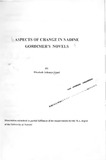| dc.description.abstract | Proceeding from a sociological literary criticism framework, this dissertation focuses on
Gordimer's later novels - July's People, None to Accompany Me and The House Gun. It
explores how these novels deal with the aspects of change, which are relations of power,
the quest for identity, and the messianic motif.
This study analyses the portrayal of characters who carry forth the theme of change. It
reveals that Gordimer incisively presents a broad spectrum of characters in her novels. It
demonstrates that these characters are realistic in that they combine the positive and
negative traits, they grow or develop, and change their perceptions. It notes that although
they represent a particular class, group or race in South Africa, these characters are also
individuals. Besides seeing them as having been used to sum up significant social
concerns, a reader learns more about them as individuals.
Our study concludes: that Gordimer's novels critically examine the South African Sociopolitical
problems and offer possible solutions, that these novels constitute a stylistic and
thematic continuum, and that the characters in these novels are used to illustrate aspects
of change. | en |

